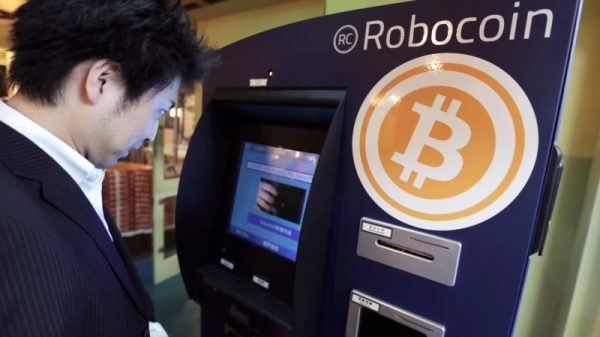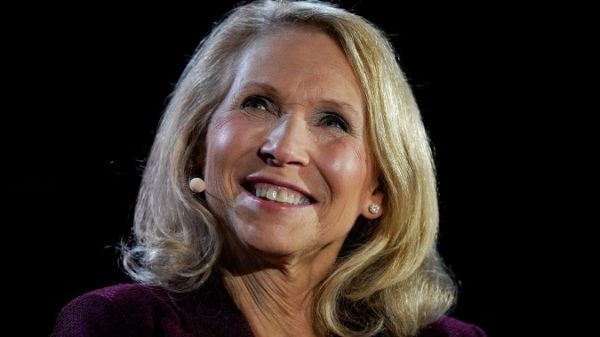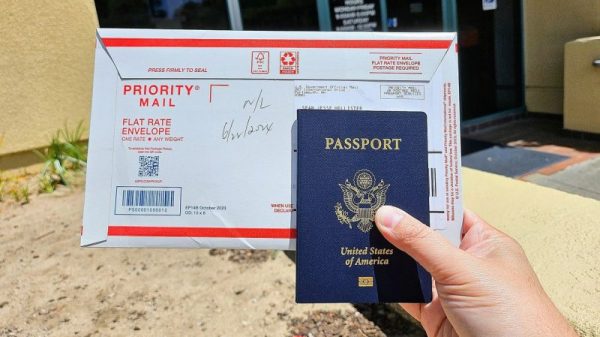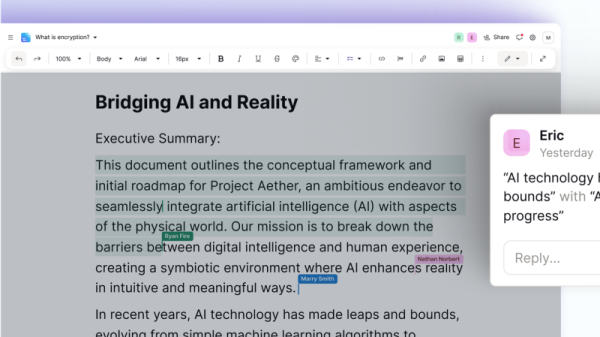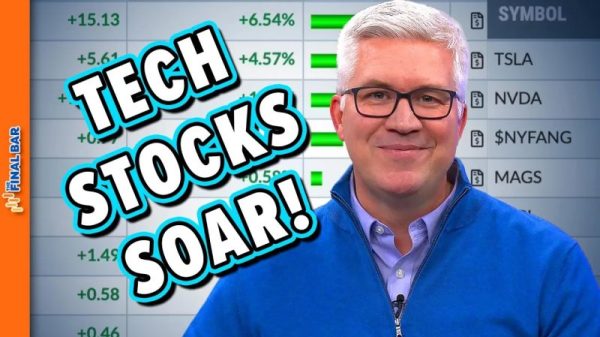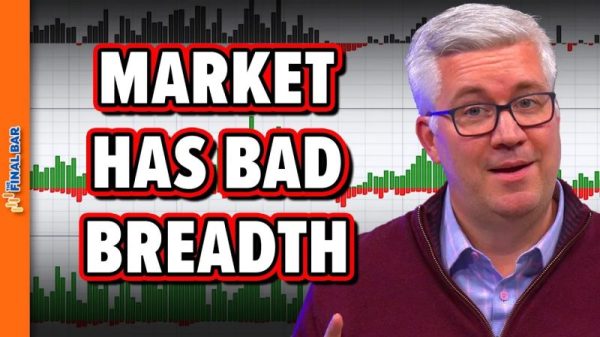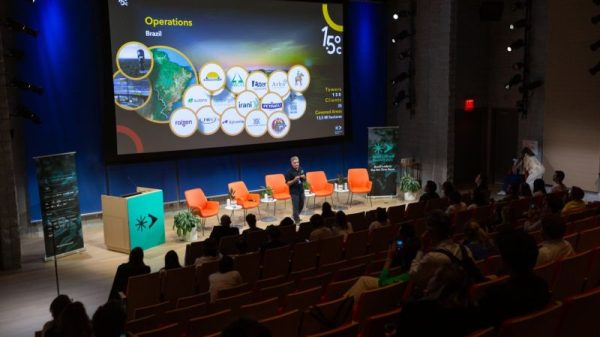After her well-received debate showing, Nikki Haley’s campaign worked the phones, collected checks from donors and raised more online in the last 24 hours than on any day since the campaign started, according to an adviser. Onstage the night before, the former U.N. ambassador had positioned herself as the biggest general election threat to Democrats and argued that Donald Trump will be too busy defending himself in court to defeat President Biden.
Vivek Ramaswamy was trying to capitalize on his own post-debate buzz. As the fiercest defender of Trump onstage, calling him “the best president of the 21st century,” the 38-year-old first-time candidate and his team looked to expand their support from small-dollar donors and grass-roots Republicans who are drawn to the former president’s combative style and extreme ideas.
Their dueling efforts served as an illustration of the chasm in the Republican Party as the underdog candidates labor in Trump’s shadow. The former president skipped Wednesday’s debate, providing an rare spotlight for his rivals. Ramaswamy and Haley offered diverging paths — with the tech entrepreneur promising to lead the party by Trump’s example and with Haley urging a break with the former president while trying to appeal to a broader sector of voters by arguing she is more electable.
But the debate did not immediately change their roles as bit players in this drama registering in single digits as Trump dominates the field. So far Republican primary voters haven’t been buying the message that Haley was trying to sell during the debate — that it’s time to move beyond Trump — and Ramaswamy has not made it clear how he would defeat Trump given that much of his success has come from emulating the former president.
In that sense, the debate was an event divorced from fundamental reality of the race: that Trump is so far ahead of his rivals that he felt no need to show up in Milwaukee for the debate. And while all the candidates had hoped to bask in the debate afterglow Thursday, attention began shift almost immediately toward the scene surrounding Trump’s surrender at a jail in Fulton County, Ga. — repeating a pattern that has played out many times this year that has appeared to help his standing in the party.
The Washington Post, FiveThirtyEight and Ipsos conducted a poll before and after Wednesday night’s debate with potential Republican primary and caucus voters, including those who watched the debate. Florida Gov. Ron DeSantis came out slightly on top, with 29 percent of Republican voters who watched the debate saying he performed best. But Ramaswamy was not far back, at 26 percent; and 15 percent called Haley the winner, with other candidates lagging well behind.
Haley showed the biggest improvement when it came to the share of Republicans who say they would consider voting for her, while DeSantis, who has been running a distant second to Trump in many polls of the GOP race, but ahead of the rest of the field, made more modest gains. So did Ramaswamy.
Some DeSantis allies lamented that Ramaswamy stole the spotlight — as he essentially presented himself as Trump 2.0 — and the former president’s chief defender, which complicated DeSantis’s effort to frame himself as Trump-without-the-baggage. One DeSantis fundraiser conceded that Trump and Ramaswamy were likely the biggest winners, while praising Haley, and said DeSantis “did nothing to hurt or help.”
But many DeSantis advisers and donors who had gathered in Milwaukee argued that DeSantis got what he needed by staying above the fray and delivering his core message. Roughly 20 donors worked the phones with DeSantis and his wife, Casey DeSantis, on Thursday, fundraising from Milwaukee and getting a briefing from top campaign advisers they described as upbeat about the debate.
Pete Snyder, a former Virginia gubernatorial candidate who helped fundraise, said DeSantis surpassed expectations and that he was “batting .800” as he made calls from a ballroom Thursday – meaning getting donations roughly 8 out of 10 dials.
Ramaswamy’s campaign said they were trying to capitalize on a huge surge in search interest on Google to bring new supporters to the campaign. The candidate spent the day reaching out to current and potential supporters through social media — continuing to build trust and conveying to his backers who were instrumental in building the momentum that his campaign is seeing. He also spent time with his kids before addressing a Republican National Committee dinner Thursday night and will head to Iowa to campaign over the next two days.
Ramaswamy’s deputy communications director, Stefan Mychajliw, predicted in Milwaukee that the debate would be like “rocket fuel for Vivek to be clearly in second place in the coming days and weeks ahead.” “The reason why Vivek went from 0.0 percent to where he is right now is the fact that he has an ‘America first’ message,” he added.
“Ukraine is not a priority for the United States of America,” Ramaswamy said at one point in the debate.
Haley later took direct aim at Ramaswamy, saying, “You have no foreign policy experience, and it shows.”
Another Ramaswamy adviser, Tricia McLaughlin, pointed to the attacks from the other candidates — Ramaswamy was a frequent target of criticism onstage Wednesday night — as evidence that “he truly is a real threat to the GOP establishment.”
For her part, Haley questioned the merits of talking up the prospect of a strict national abortion ban, as former vice president Mike Pence has done. “No Republican president can ban abortions any more than a Democrat president can ban all those state laws,” Haley said. “Don’t make women feel like they have to decide on this issue when you know we don’t have 60 Senate votes.”
She also took on Trump, whom she served under as U.N. ambassador, calling him “the most disliked politician in America.’
Fred Zeidman, a major GOP donor backing Haley, said he’d told her a couple of times: “We need a moment.” She delivered, he said in an interview Thursday after attending the debate: “I really think she put herself in the conversation last night.”
After the debate, he headed to the restaurant where Haley and her supporters had gathered and found it was packed. “She obviously had hit a home run,” he said.
But both Haley and Ramaswamy were not only contending with Trump and each other. There was DeSantis, who has struggled for months, but drew praise from some donors for his performance. DeSantis appeared tentative or evasive at times in the debate, including when he was slower than others to raise his hand during a question about backing Trump if he won the nomination and was convicted of a crime. Still, some supporters called his performance effective, if not flashy.
Jay Zeidman, Fred Zeidman’s son, said his group texts with DeSantis supporters and “like-minded Republicans” lit up with positive feedback Wednesday night. “He didn’t need to come out and look desperate to try to win, like some of the other candidates,” Zeidman said of DeSantis. “He just needed to have this sort of two hours unfiltered access and not be clouded by the shadow of Trump. I think he achieved that.”
Roy Bailey, a former national co-chairman of the Trump campaign who is now a major donor to DeSantis and attended the debate, said DeSantis “hit on all the notes.”
“He showed his leadership abilities. He showed his executive experience. He was very direct, talking into people’s living room about what he will do on the border, what he will do on crime,” Bailey said. “He stayed out of the finger-wagging NASCAR wreckages that went on and stayed on message and just had a great debate.”
DeSantis allies were also pleased by the lack of a breakout moment for Sen. Tim Scott (R-S.C.), since he had been perceived before the debate as one of the strongest challengers vying for the second-place spot occupied by DeSantis.
“Tim Scott had been creeping up a little bit in Iowa,” said Hal Lambert, one of the DeSantis donors who helped fundraise post-debate. But at the debate, Lambert said, “it was kind of like was he wasn’t there onstage.”
But Matt Gorman, senior communications adviser to Scott, said “too much of the debate was crosstalk and childish exchanges” and that “Tim wasn’t going to waste time with it.”
As the candidates who did well raced to use that momentum to fill their coffers Thursday, Rob Godfrey, a South Carolina-based consultant and a former Haley deputy chief of staff (who is neutral in the race), noted where the race goes from here will hinge on whether each campaign has the infrastructure to capitalize on this moment.
“While I think a strong debate performance can help any candidate on a variety of fronts, it has to be part of a larger strategy that takes into account everything that it takes to win an election,” he said.
Knowles and Wells reported from Milwaukee. Michael Scherer contributed to this report.
After her well-received debate showing, Nikki Haley’s campaign worked the phones, collected checks from donors and raised more online in the last 24 hours than on any day since the campaign started, according to an adviser. Onstage the night before, the former U.N. ambassador had positioned herself as the biggest general election threat to Democrats and argued that Donald Trump will be too busy defending himself in court to defeat President Biden.
Vivek Ramaswamy was trying to capitalize on his own post-debate buzz. As the fiercest defender of Trump onstage, calling him “the best president of the 21st century,” the 38-year-old first-time candidate and his team looked to expand their support from small-dollar donors and grass-roots Republicans who are drawn to the former president’s combative style and extreme ideas.
Their dueling efforts served as an illustration of the chasm in the Republican Party as the underdog candidates labor in Trump’s shadow. The former president skipped Wednesday’s debate, providing an rare spotlight for his rivals. Ramaswamy and Haley offered diverging paths — with the tech entrepreneur promising to lead the party by Trump’s example and with Haley urging a break with the former president while trying to appeal to a broader sector of voters by arguing she is more electable.
But the debate did not immediately change their roles as bit players in this drama registering in single digits as Trump dominates the field. So far Republican primary voters haven’t been buying the message that Haley was trying to sell during the debate — that it’s time to move beyond Trump — and Ramaswamy has not made it clear how he would defeat Trump given that much of his success has come from emulating the former president.
In that sense, the debate was an event divorced from fundamental reality of the race: that Trump is so far ahead of his rivals that he felt no need to show up in Milwaukee for the debate. And while all the candidates had hoped to bask in the debate afterglow Thursday, attention began shift almost immediately toward the scene surrounding Trump’s surrender at a jail in Fulton County, Ga. — repeating a pattern that has played out many times this year that has appeared to help his standing in the party.
The Washington Post, FiveThirtyEight and Ipsos conducted a poll before and after Wednesday night’s debate with potential Republican primary and caucus voters, including those who watched the debate. Florida Gov. Ron DeSantis came out slightly on top, with 29 percent of Republican voters who watched the debate saying he performed best. But Ramaswamy was not far back, at 26 percent; and 15 percent called Haley the winner, with other candidates lagging well behind.
Haley showed the biggest improvement when it came to the share of Republicans who say they would consider voting for her, while DeSantis, who has been running a distant second to Trump in many polls of the GOP race, but ahead of the rest of the field, made more modest gains. So did Ramaswamy.
Some DeSantis allies lamented that Ramaswamy stole the spotlight — as he essentially presented himself as Trump 2.0 — and the former president’s chief defender, which complicated DeSantis’s effort to frame himself as Trump-without-the-baggage. One DeSantis fundraiser conceded that Trump and Ramaswamy were likely the biggest winners, while praising Haley, and said DeSantis “did nothing to hurt or help.”
But many DeSantis advisers and donors who had gathered in Milwaukee argued that DeSantis got what he needed by staying above the fray and delivering his core message. Roughly 20 donors worked the phones with DeSantis and his wife, Casey DeSantis, on Thursday, fundraising from Milwaukee and getting a briefing from top campaign advisers they described as upbeat about the debate.
Pete Snyder, a former Virginia gubernatorial candidate who helped fundraise, said DeSantis surpassed expectations and that he was “batting .800” as he made calls from a ballroom Thursday – meaning getting donations roughly 8 out of 10 dials.
Ramaswamy’s campaign said they were trying to capitalize on a huge surge in search interest on Google to bring new supporters to the campaign. The candidate spent the day reaching out to current and potential supporters through social media — continuing to build trust and conveying to his backers who were instrumental in building the momentum that his campaign is seeing. He also spent time with his kids before addressing a Republican National Committee dinner Thursday night and will head to Iowa to campaign over the next two days.
Ramaswamy’s deputy communications director, Stefan Mychajliw, predicted in Milwaukee that the debate would be like “rocket fuel for Vivek to be clearly in second place in the coming days and weeks ahead.” “The reason why Vivek went from 0.0 percent to where he is right now is the fact that he has an ‘America first’ message,” he added.
“Ukraine is not a priority for the United States of America,” Ramaswamy said at one point in the debate.
Haley later took direct aim at Ramaswamy, saying, “You have no foreign policy experience, and it shows.”
Another Ramaswamy adviser, Tricia McLaughlin, pointed to the attacks from the other candidates — Ramaswamy was a frequent target of criticism onstage Wednesday night — as evidence that “he truly is a real threat to the GOP establishment.”
For her part, Haley questioned the merits of talking up the prospect of a strict national abortion ban, as former vice president Mike Pence has done. “No Republican president can ban abortions any more than a Democrat president can ban all those state laws,” Haley said. “Don’t make women feel like they have to decide on this issue when you know we don’t have 60 Senate votes.”
She also took on Trump, whom she served under as U.N. ambassador, calling him “the most disliked politician in America.’
Fred Zeidman, a major GOP donor backing Haley, said he’d told her a couple of times: “We need a moment.” She delivered, he said in an interview Thursday after attending the debate: “I really think she put herself in the conversation last night.”
After the debate, he headed to the restaurant where Haley and her supporters had gathered and found it was packed. “She obviously had hit a home run,” he said.
But both Haley and Ramaswamy were not only contending with Trump and each other. There was DeSantis, who has struggled for months, but drew praise from some donors for his performance. DeSantis appeared tentative or evasive at times in the debate, including when he was slower than others to raise his hand during a question about backing Trump if he won the nomination and was convicted of a crime. Still, some supporters called his performance effective, if not flashy.
Jay Zeidman, Fred Zeidman’s son, said his group texts with DeSantis supporters and “like-minded Republicans” lit up with positive feedback Wednesday night. “He didn’t need to come out and look desperate to try to win, like some of the other candidates,” Zeidman said of DeSantis. “He just needed to have this sort of two hours unfiltered access and not be clouded by the shadow of Trump. I think he achieved that.”
Roy Bailey, a former national co-chairman of the Trump campaign who is now a major donor to DeSantis and attended the debate, said DeSantis “hit on all the notes.”
“He showed his leadership abilities. He showed his executive experience. He was very direct, talking into people’s living room about what he will do on the border, what he will do on crime,” Bailey said. “He stayed out of the finger-wagging NASCAR wreckages that went on and stayed on message and just had a great debate.”
DeSantis allies were also pleased by the lack of a breakout moment for Sen. Tim Scott (R-S.C.), since he had been perceived before the debate as one of the strongest challengers vying for the second-place spot occupied by DeSantis.
“Tim Scott had been creeping up a little bit in Iowa,” said Hal Lambert, one of the DeSantis donors who helped fundraise post-debate. But at the debate, Lambert said, “it was kind of like was he wasn’t there onstage.”
But Matt Gorman, senior communications adviser to Scott, said “too much of the debate was crosstalk and childish exchanges” and that “Tim wasn’t going to waste time with it.”
As the candidates who did well raced to use that momentum to fill their coffers Thursday, Rob Godfrey, a South Carolina-based consultant and a former Haley deputy chief of staff (who is neutral in the race), noted where the race goes from here will hinge on whether each campaign has the infrastructure to capitalize on this moment.
“While I think a strong debate performance can help any candidate on a variety of fronts, it has to be part of a larger strategy that takes into account everything that it takes to win an election,” he said.
Knowles and Wells reported from Milwaukee. Michael Scherer contributed to this report.




